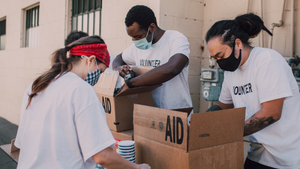Joint $10M NLC, Wells Fargo Foundation initiative seeks to curb violence in cities
April 29, 2022

Unfortunately, shootings and violence and American cities have become a daily occurrence—they occur so frequently that many fail to make headlines. The latest initiative launched to curb this terrible trend, the Municipalities Reimagining Community Safety Initiative, is a collaborative effort from the National League of Cities (NLC) with support from the Wells Fargo Foundation.
The cities selected to participate in the two-year program include Baltimore, Md., Dallas, Tx., Jackson, Miss., Philadelphia, Penn., and St. Louis. Mo. Each was selected for a demonstrated desire to “move toward equity driven community safety initiatives that reduce and prevent crime alongside and in conjunction with their residents,” according to a statement about the endeavor.
The initiative will connect elected leaders and municipal staff, constituents and area organizations with national experts for guidance to promote community-centered safety efforts. It’s designed to spark action at the local level and put into action comprehensive community plans in partnership with Black and Brown communities.
“This is a great opportunity to network with colleagues and experts to learn what works in the short-term and long-term to make Jackson a safer place for all,” said Chokwe Antar Lumumba, mayor of Jackson, in a statement about the program. “I am proud to have been selected for this initiative.”
In practice, the initiative builds on NLC’s recent report, “A Path Toward Safe and Equitable Cities,” which recommends a community-level approach to stemming violence in cities. Instead of reacting to violence when it happens, the report outlines an intervention framework that extends “beyond the traditional use of the word safety to embrace a far broader set of conditions and circumstances that center public health or more simply, wellbeing.”
This focus on public health emphasizes good living conditions free of hazards, well-maintained open spaces, job and housing security, access to reliable connectivity and intentional engagement with those most vulnerable to violence or violent behavior. The approach “requires deep and complex public discussions and joint decisions about shared goals.” It also calls for commitment from dedicated public servants and a shared vision that spans various organizations.
At the program’s heart is a mission to address the root causes of violence as opposed to reacting after the fact, according to John Engen, mayor of Missoula, Mt., who is quoted in the report. He described those root causes as “issues around income inequality, racism, classism, sexism (the list goes on). We are treating symptoms—but we hope to eventually get to the cure.”
The approach is in line with guidance issued by the White House last year. In a memo drafted for state and local governments, the Biden Administration advised leaders looking to put their American Rescue Plan funding toward violence prevention to invest in early interventions like those outlined in NLC’s report.
Beyond a one-time investment, the approach outlined in NLC’s report—which promotes civilian-led strategies and oversight—requires a fundamental restructuring of the approach governments take to public safety, and a redefinition of the role government agencies take in violence prevention. The report notes this is a step “communities have demanded and for which many police leaders have asked, in lieu of having their departments hold perceived or actual sole responsibility for providing public safety.”
The mayors participating in the recently announced joint program have likewise embraced the proposed change.
“I greatly appreciate the ongoing partnership between NLC and my administration, including the Reimagining Public Safety Task Force and City Justice Policy Advisors Network,” said Brandon Scott, mayor of Baltimore. “I am confident that this new initiative focused on expanding current efforts to improve public safety and substantial engagement of residents most impacted by violence will make Baltimore a safer and healthier city.”
Each participating city will receive about $1 million of a $10 million commitment from Wells Fargo, of which $6 million will go directly to cities.
The funding will go “to organize, focus and expand the safety and violence reduction strategies of municipal agencies and their community partners,” said Clarence Anthony, NLC’s executive director and CEO. “We look forward to highlighting the progress in these cities, and lessons learned for other cities, at upcoming conferences.”







